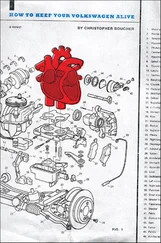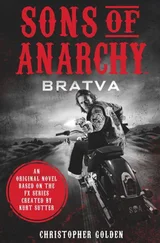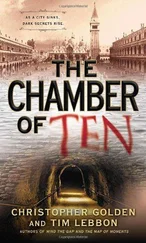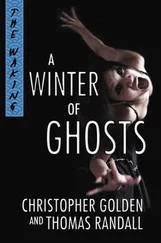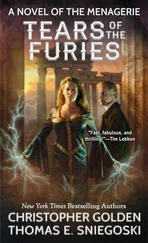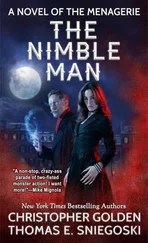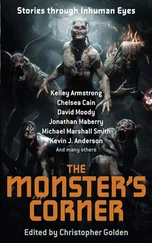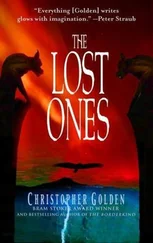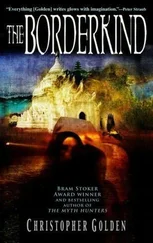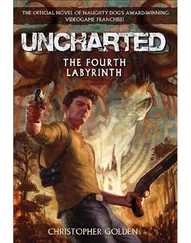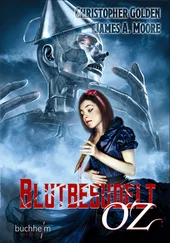So I dressed the wound myself. As I wrapped the thought’s leg in mental gauze, I thought, “What happened to the other thought?”
“I killed it,” said the thought.
“How?”
“With my bayonet,” he said. And then he held up a mental bayonet, covered in a blue liquid.
What’s that blue stuff? I wondered.
“The thoughtblood of my enemy,” said the thought.
That thought recovered, but it was just one in a legion of thoughts who wandered into — or sometimes went looking for — trouble. Sometimes they made it difficult for me to concentrate; I made mistakes when working with my Dad at the buildings, and I was always getting detention in school. After a while, I didn’t mind it — I’d sit in whatever cage they put me in. I always carried a few deadwords in my pocket for just that occasion. In a cage, I could spend days on a single phrase: I’d take apart the expression, the words, the letters themselves.
Then, in the spring of ’88, something terrible happened. I woke up one morning and a thought of sidewalks was sitting at my desk. His skin was pale and there were rings under his eyes. “What is it?” I said.
“Something — terrible,” he said.
“Show me,” I said.
He led me out the window and down onto the driveway. I unlocked my Bicycle Built for Two and the thought leapt onto the handlebars. I took the front seat and the Reader got on the back. “Where to?” I said.
The thought pointed east. “Heights,” he said.
Appleseed Heights was a new condominium development down by the east edge of town. A year earlier that area had all been wilderness. Now, Orange Traffic Cones were driving yellow bulldozers in there and knocking down the trees. The trees were holding protests, singing songs, fighting back. Every week there was news of another tree/bulldozer scuffle. The week prior, a bulldozer had been jumped by a bunch of trees and a rumble had ensued.
As we approached, I saw Orange Traffic Cones standing in a triangle right off the road. Some of the Cones were holding fluorescent tape; others were kneeling around a thought-shaped chalk outline.
When I rode the Bicycle Built for Two up to them, I saw what they were kneeling over: a dead thought. My dead thought, a thought of the future, bleeding into the sienna dirt.
A dented Cone with a moustache held up his orange rubbery arm. “Nothing to see here,” he said.
“That’s his thought,” said the Reader. “He’s the thinker.”
The Cone’s eyes darkened.
“How did he—” I said. I began to cry. “What happened?”
The Cone crossed his arms. “He was — there was a—”
Another Cone approached. “You the thinker?” he asked me.
I nodded.
“Thought was mauled,” said the Cone.
“By what?” said the thought of sidewalks.
The Cone shook his head. “We’re not sure,” he said. “We’ll know more after the thoughtopsy. Did he have any enemies that you know of?”
I shook my head and wiped my face. “He was such a kind and thoughtful. Into surfing and meditation. He wouldn’t have thought about hurting the thought of a fly .”
“Sometimes a thought leads a double life,” suggested the Cone.
I shook my head again. “Not this one,” I said.
The following week I held a funeral in my mind. All of my available thoughts attended. I held it on a Wednesday morning. The body of the thought was displayed in a coffin, and all my thoughts walked past it and thought about praying.
Outside my skull, meanwhile, I was in algebra class. The teacher, a hairy plus sign, was drawing some bullshit on the board. “This makes Y equal — who knows the answer?”
The thought’s mother ambled up to the coffin and collapsed in tears.
“  ,” said the hairy plus sign.
,” said the hairy plus sign.
“My boy,” said the motherthought. “My son.”
“Y equals?” said the plus sign.
The fatherthought consoled his ex-wife.
“Earth to  . What does Y equal?”
. What does Y equal?”
But I couldn’t answer, because it was that part of the service where they were lowering the thought into the ground in my mind, throwing mindirt over it and saying goodbye forever. It was so sad. A thought with its whole life ahead of it!
“  !”
!”
“What?” I shouted.
“Do you know the answer?” said the plus sign.
“Who cares !” I roared. “Don’t you have any respect for the dead?”
YOU CAN’T DO THAT ON TELEVISION
Like most of the kids I knew, we had televisions watching us in every room, recording our movements and prayers, and praying them out as sitcoms and laugh-out-louds to other families in Appleseed. Our sitcom was called The Marginals , about a family that lives really close to the margin. I think back on those times, the times of the show, as some of the best of my childhood. Every day between the ages of five and thirteen I came home from school, looked over my script, and put on my costume: shiny Nike shoes instead of my secondhand unmatching Converse hi-tops, stonewashed jeans instead of vinyl parachute pants, an Ocean Pacific T-shirt over my cigarette shirt from the Salvation Army, a toupee cut in the latest fashion — a tail in the back or pleats shaved into the sides — to cover my bald head. Then I’d open up a closet of smiles in the back room, pick one out, and put it on. Sometimes I’d choose a wide smile, but usually I’d pick a smirk, like this one:
In the story of The Marginals I was Scooter LaFontaine, always getting into trouble that led to valuable lessons. My signature lines were, “Who, me?” and “Nice fine good OK!”
Everyone in my family was part of the show. My sister played Samantha LaFontaine, the town’s tap dancing champion (even though Bri hated tap dancing — her real passion was for collectibles, antiques, and junk). My father played a cambridge and my Mom a really kind nurse. And she was great at it. When she was in costume, I saw kindnesses from her that she rarely showed in person. In one episode, I saw her cradle a dying sentence in her arms as if she were its mother. In another, I was crushed by a last-second loss in a swim meet. In the car, she turned to me and said, “You tried your best , Scoot. Didn’t you?”
My character, Scooter, nodded.
“And wasn’t that your fastest time ever in backstroke?”
I shrugged.
“Then you won. You did better than ever before. What more could you want, honey?”
The show had certain tropes. Like, every show included a dinner scene.
“How was your day today, Scoot?” my Dad would ask.
With that line and almost every other, we’d hear the laughtrack: our cans in the pantry, chuckling and guffawing.
“We learned about photosynthesis,” I said. “How plants transform light into food.”
Haw .
“I wish we could transform this food,” my sister said.
Ha haw haw ha .
“Now, Sam,” said my Mom. “It’s just a pleasure for the four of us to eat together.”
“ I think the ham is great,” said my Dad. “Don’t you, Scoot?”
“Nice fine good OK!” I said.
Every episode ended with a moral, delivered to me or my sister from my father or mother while sitting on the back stoop: “If they’re cruel to you,” the mother-character told the Scooter-character once, “then they aren’t really your friends. Friends will watch out for you through thick and thin.”
Читать дальше
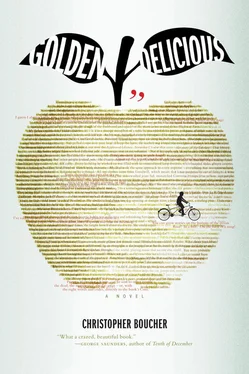
 ,” said the hairy plus sign.
,” said the hairy plus sign.
